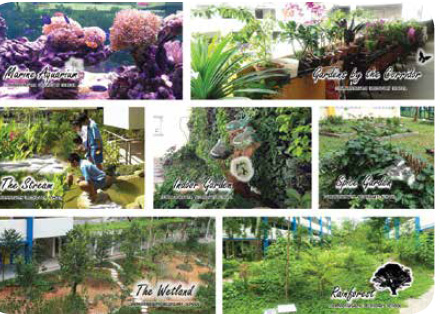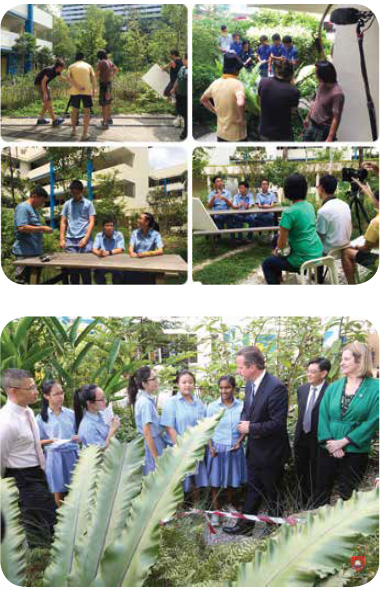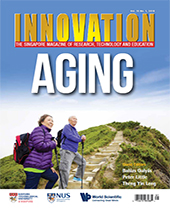|
by Tan Guan Rui, Jacob

The school promotes environmental and community sustainability through the following strategies:
- creating new knowledge about environmental issues through scientific inquiry and research
- organizing education and outreach programs
- developing student leadership in environmental and community issues

Underlying these strategies is nurturing students' appreciation of and connection with the natural world. Once this connection is developed, advocacy and activism emerge as a natural outflow of this love for nature. The school's role in this is doubly important
The school's environment has also enhanced the school's teaching and learning. Environmental education has been infused into the school's Total Curriculum, serving as a medium by which students can benefit from experiential learning. Every academic department has designed at least one lesson per semester that draws on the Eco-Habitats as a rich source of learning. Teachers have developed creative ideas to infuse environmental education into their teaching and learning plans. The Biology Unit plays a key role in demonstrating how the school's environment can be used for teaching and learning. Based on the learning gained by a member of the team who attended the Ministry of Education's Overseas Teacher Attachment Programme (OTAP) in Costa Rica, Secondary One Science (Biology) teachers implemented two innovative activities in the Lower Secondary Science Syllabus.
- The "Fern-O-Rama" ecology activity directs Secondary One students to catalogue various fern species in the Rainforest Eco-Habitat, and to learn how a quadrat can be used to survey a plot of land. During the pilot class, students counted 19 different fern species using a biodiversity sampling technique, differentiating species based on morphological characteristics. Students were amazed at the large number of fern species, and gained a new appreciation of biodiversity and its importance through experiential learning.
- The "Nature Wonder Video" activity is a Science Project for Secondary 1 Express students who learn principles of documentary video-making. Students create short videos that provide an overview of the interactions within ecosystems and use examples in the school's Eco-Habitats to illustrate their observations.
In addition to Biology lessons, other departments utilize the Eco-Habitats to facilitate experiential learning. For example, Mathematics lessons use growth patterns of tree branches to explore the Fibonacci sequence, and Literature lessons invite students to write poetry inspired by the Eco-Habitats.

Use of Technology
Leveraging technology, the school uses social media to raise students’ awareness of environmental issues and nurture their appreciation of biodiversity. For example, students are encouraged to post photos on Instagram to share their sightings with the school community and the world using the hashtag "#cwssbiodiversity". Through the photos and captions, students benefit from bite-sized lessons on biodiversity, and are more deeply engaged.
Involvement of the School Community
The school's Eco-Club takes the lead in championing environmental issues among the student community. For example, Eco-Club students regularly conduct biodiversity audits to create a record of organisms (e.g. butterflies and birds) observed within the school's grounds. In addition, teams of Eco-Club students are assigned to each of the Eco-Habitats as environmental consultants. This gives the students ownership of the habitats, and encourages them to contribute directly to the upkeep and well-being of the environment.
The school also involves the broader student community directly in environmental issues. Since November 2015, "Operation Golden Apple Snail" has become a community effort to eradicate this invasive snail species from The Wetland Eco-Habitat. After five months of hand-picking by staff and students in The Wetland, the students witness the reverse of the ecological conditions where Malaysian Trumpet Snails, a native freshwater snail species, are increasing in numbers in The Wetland. The collective effort of the school community to control this invasive species brings across the global threat to biodiversity in an authentic way.
Developing Environmental Educators
As the West Zone Centre of Excellence for Environmental Education, the school provides professional development opportunities for teachers across Singapore. In 2015, the school conducted an "Educators Learning Journey for Biodiversity", equipping them to infuse Environmental Education into their respective subject disciplines. Participants also learnt about the green initiatives in Commonwealth Secondary School, and went on an experiential biodiversity trail to learn how students can engage in meaningful environment-related activities. With its emphasis on biodiversity, the school also contributes to the professional development of Biology teachers through a partnership with the Biology chapter of the Academy of Singapore Teachers.
Contributing to National Green Efforts
The school is an active partner of the National Environment Agency (NEA) and the National Parks Board (NParks) in championing environmental awareness and advocacy. To this end, the school participates actively in national events such as the Youth Environment Day where it premiered the "NParks CIN Showcase: Greening Schools for Biodiversity" video, produced in collaboration with NParks. The video showcase includes the story behind our school's greening journey and how students' learning has been enhanced.
As a valued partner to these national agencies, the school has been among the first to pilot programs such as the NParks "Greening Schools for Biodiversity Programme", where students are trained as citizen scientists who collect valuable data (e.g. about birds in our parks, gardens and reserves), contributing to a bigger picture of Singapore's biodiversity. The school was also selected by NParks to be one of three pilot schools for its "Native Plant Conservation Programme", where students from the Eco-Club worked with NParks officers to plant species of native plants in the Rainforest Eco-Habitat. These plants had been salvaged from plots of land which were marked for redevelopment, so that they can be reintroduced and propagated in nature reserves.
Environmental Ambassadors to the World
Arising from the strengths of the school's environmental education programs, it also had the opportunity to host many international visitors. This provided our students and staff with the opportunity to network and learn from the expertise and experience of our guests. The school hosted the visits by Sino-Singapore Tianjin Eco-city (SSTEC), the Ministry of Foreign Affairs and National Institute of Education's delegates and the Suan Sunandha Rajabhat University (Thailand) among others. The school also hosted the visit by Prime Minister of UK Mr David Cameron, then-Minister for Education Mr Heng Swee Keat and their delegation on 29 July 2015 during which the teachers conducted live experiential learning science lesson showcasing how students learnt about ecology through the school's Rainforest Eco-Habitat. Students also had the opportunity to interact with Mr David Cameron during the science lesson.
Conclusion
Commonwealth Secondary School has designed a unique integration of program and learning environment to create an impactful approach to environmental education. As it shares its approach in order to benefit partners and visitors from Singapore and around the world, the school is also charting the way forward to bring its program to the next stage of development to better nurture globally-oriented advocates and activists for the environment.
Mr Tan Guan Rui, Jacob, is a Biology teacher and the teacher-in-charge of Eco Club in Commonwealth Secondary School.
For more information about this article, please contact Mr Tan at tan.guanrui@commonwealthsec.moe.edu.sg
Reference
Strong-Wilson, T. (n.d.). Children and Place: Reggio Emilia's Environment As Third Teacher. Theory Into Practice , 46(1), 40-47.
 Click here to download the full issue for USD 6.50 Click here to download the full issue for USD 6.50
|





 Click here to download the full issue for USD 6.50
Click here to download the full issue for USD 6.50